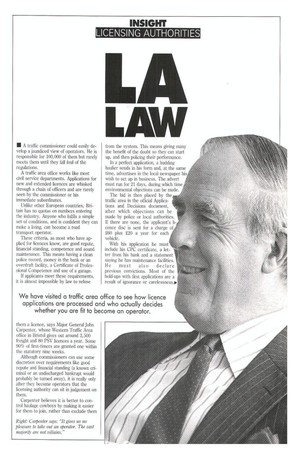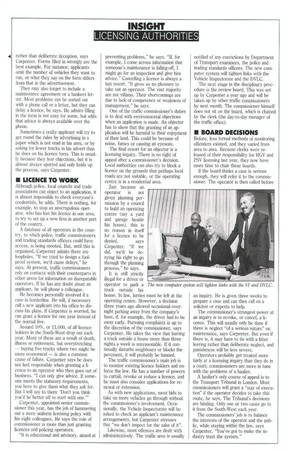INSIGHT LICENSING AUTHORITIES LAW • A traffic commissioner could easily
Page 59

Page 61

If you've noticed an error in this article please click here to report it so we can fix it.
develop a jaundiced view of operators. He is responsible for 100,000 of them but rarely meets them until they fall foul of the regulations.
A traffic area office works like most civil service departments. Applications for new and extended licences are whisked through a chain of officers and are rarely seen by the commissioner or his immediate subordinates.
Unlike other European countries, Britain has no quotas on numbers entering the industry. Anyone who fulfils a simple set of conditions, and is confident they can make a living, can become a road transport operator.
These criteria, as most who have applied for licences know, are good repute, financial standing, competence and sound maintenance. This means having a clean police record, money in the bank or an overdraft facility, a Certificate of Professional Competence and use of a garage.
If applicants meet these requirements, it is almost impossible by law to refuse them a licence, says Major General John Carpenter, whose Western Traffic Area office in Bristol gives out around 2,500 freight and 80 PSV licences a year. Some 90% of first-timers are granted one within the statutory nine weeks.
Although commissioners can use some discretion over requirements like good repute and financial standing (a known criminal or an undischarged bankrupt would probably be turned away), it is really only after they become operators that the licensing authority can sit in judgement on them.
Carpenter believes it is better to control haulage cowboys by making it easier for them to join, rather than exclude them from the system. This means giving many the benefit of the doubt so they can start up, and then policing their performance.
In a perfect application, a budding haulier sends in his form and, at the same time, advertises in the local newspaper his wish to set up in business. The advert must run for 21 days, during which time environmental objections can be made.
The bid is then placed by the traffic area in the official Applications and Decisions document, after which objections can be made by police or local authorities. If there are none, the applicant's licence disc is sent for a charge of 260 plus 220 a year for each vehicle.
With his application he must include his CPC certificate, a letter from his bank and a statement saying he has maintenance facilities. He must also declare previous convictions. Most of the hold-ups with first applications are a result of ignorance or carelessness,■ rather than deliberate deception, says Carpenter. Forms filled in wrongly are the best example. For instance, applicants omit the number of vehicles they want to run, or what they say on the form differs from that in the advertisement.
They may also forget to include a maintenance agreement or a bankers letter. Most problems can be sorted out with a phone call or a letter, but they can delay a licence, he says. He admits filling in the form is not easy for some, but adds that advice is always available over the phone.
Sometimes a crafty applicant will try to get round the rules by advertising in a paper which is not read in his area, or by asking for fewer trucks in his advert than he does on his licence form. This is usually because they fear objections, but it is almost always spotted and only holds up the process, says Carpenter.
• LICENCE TO WORK Although police, local councils and trade associations can object to an application, it is almost impossible to check everyone's credentials, he adds. There is nothing, for example, to stop an unscrupulous operator, who has lost his licence in one area, to try to set up a new firm in another part of the country.
A database of all operators in the country, to which police, traffic commissioners and trading standards officers could have access, is being mooted. But, until this is organised, Carpenter admits there are loopholes. "If we tried to design a foolproof system, we'd cause delays," he says. At present, traffic commissioners rely on contacts with their counterparts in other areas for information on disreputable operators. If he has any doubt about an applicant, he will phone a colleague.
He becomes personally involved if a case is borderline. He will, if necessary call a new applicant into his office to discuss his plans. If Carpenter is worried, he can grant a licence for one year instead of the normal five.
Around 10%, or 11,000, of all licenceholders in the South-West drop out each year. Many of these are a result of death, illness or retirement, but overstretching — buying five trucks where two might be more economical — is also a common cause of failure. Carpenter says he does not feel responsible when granting a licence to an operator who then goes out of business. "I can only give advice. If someone meets the statutory requirements, you have to give them what they ask for. But I will say to them: 'Don't you think you'd be better off to start with one."
Carpenter, appointed senior commissioner this year, has the job of hammering out a more uniform licensing policy with his eight colleagues. He says the role of commissioner is more than just granting licences and policing operators.
"It is educational and advisory, aimed at preventing problems," he says. "If, for example, I come across information that someone's maintenance is falling-off, I might go for an inspection and give him advice." Cancelling a licence is always a last resort. "It gives us no pleasure to take out an operator. The vast majority are not villains. Their shortcomings are due to lack of competence or weakness of management," he says.
One of the traffic commissioner's duties is to deal with environmental objections when an application is made. An objector has to show that the granting of an application will be harmful to their enjoyment of their land. This could be because of noise, fumes or causing an eyesore.
The final resort for an objector is a licensing inquiry. There is no right of appeal after a commissioner's decision. Local authorities can also try to block a licence on the grounds that perhaps local roads are not suitable, or the operating centre is in a residential area.
Just because an operator is not given planning permission by a council to build an operating centre (say a yard and garage beside his house), this is no reason in itself for a licence to be denied, says Carpenter. "If we did, we'd be denying his right to go through the planning process," he says.
It is still strictly illegal for a driver or operator to park a truck outside his house. In law, lorries must be left at the operating centre. However, a decision three years ago allowed occasional overnight parking away from the company's base, if, for example, the driver had to be away early. Pursuing complaints is up to the discretion of the commissioner, says Carpenter. He takes the view that leaving a truck outside a house more than three nights a week is unreasonable. If it continually disturbs neighbours or blocks the pavement, it will probably be banned.
The traffic commissioner's main job is to monitor existing licence holders and enforce the law. He has a number of powers to curtail, revoke or reduce a licence, and he must also consider applications for renewal or extension.
As with new applications, most bids to take on more vehicles go through without the commissioner's involvement. Occasionally, the Vehicle Inspectorate will be asked to check an applicant's maintenance arrangements, but Carpenter stresses that "we don't inspect for the sake of it".
Likewise, most offences are dealt with administratively. The traffic area is usually notified of any convictions by Department of Transport examiners, the police and trading standards officers. The new computer system will tighten links with the Vehicle Inspectorate and the DVLC.
The next stage in the disciplinary procedure is the review board. This was set up by Carpenter a year ago and will be taken up by other traffic commissioners by next month. The commissioner himself does not sit on the board, which is chaired by the clerk (the day-to-day manager of the traffic office).
• BOARD DECISIONS Before, less formal methods of monitoring offenders existed, and they varied from area to area. Because clerks were released of their responsibility for HGV and PSV licensing last year, they now have more time to chair these boards.
If the board thinks a case is serious enough, they will refer it to the commissioner. The operator is then called before an inquiry. He is given three weeks to prepare a case and can then call on a solicitor or experts to help.
The commissioner's strongest power at an inquiry is to revoke, or cancel, a licence. This will usually only be done if there is neglect "of a serious nature" on maintenance, says Carpenter. But even if there is, it may have to do with a fitter leaving rather than deliberate neglect, and punishment will be less severe.
Operators probably get treated more fairly at a licensing inquiry than they do in a court; commissioners are more in tune with the problems of a haulier.
A haulier's only course of appeal is to the Transport Tribunal in London. Most commissioners will grant a "stay of execution" if the operator decides to take this route, he says. The Tribunal's decisions are binding. Only one or two cases go to it from the South-West each year.
The commissioners' job is to balance the interests of the operator and the public, while staying within the law, says Carpenter. "You've got to make the industry trust the system."




































































































